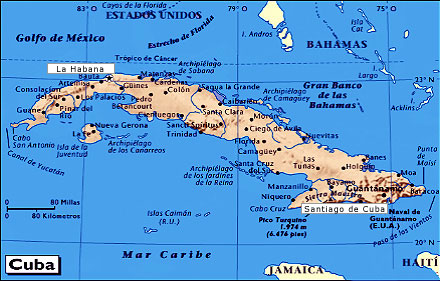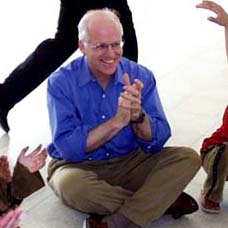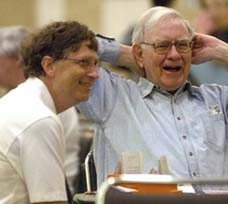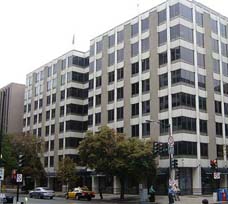2006.08.18: August 18, 2006: Headlines: Cuba: Medicine: Huffington Post: Sarah Stevens writes: Cuba's doctors today are what President Kennedy's Peace Corps volunteers were in the 1960s - they are the faces of Cuba's foreign aid program
Peace Corps Online:
Peace Corps News:
Peace Corps Library:
Medicine:
January 23, 2005: Index: PCOL Exclusive: Medicine :
2006.08.18: August 18, 2006: Headlines: Cuba: Medicine: Huffington Post: Sarah Stevens writes: Cuba's doctors today are what President Kennedy's Peace Corps volunteers were in the 1960s - they are the faces of Cuba's foreign aid program
Sarah Stevens writes: Cuba's doctors today are what President Kennedy's Peace Corps volunteers were in the 1960s - they are the faces of Cuba's foreign aid program

With Castro's current illness, we can now see the future: Cubans have stability, not a crisis, and a succession plan, not a vacuum. America, having walled itself off from the Cuban people with its ban on travel, trade, and diplomacy, can peer over that wall and see China and Venezuela and the nations of Western Europe hard at work enjoying normal relations with Cuba. Even Cuba's dissidents are calling on the United States to back off, and let Cubans decide Cuba's future for themselves.
Sarah Stevens writes: Cuba's doctors today are what President Kennedy's Peace Corps volunteers were in the 1960s - they are the faces of Cuba's foreign aid program
Is There a Doctor in the House? (16 comments )
In Barlovento, Venezuela, about ninety miles from Caracas, Cuban doctors are providing medical assistance to local Afro-Caribbean families, many of whom never had access to health care before.
Now, the Bush administration has a message to those Cuban doctors: "Drop what you're doing and come to the United States. Don't worry about the immigration line; we'll put you right at the front."
What is going on?
For years, U.S. foreign policy has operated under a myth that Cubans are waiting for the United States to intervene when President Castro's rule comes to its end. We've spent and wasted millions of dollars writing transition plans. Our plans are predicated on Cuba plunging into crisis, and Cubans calling for Uncle Sam to step in and determine a new system of governance and economics for them.
With Castro's current illness, we can now see the future: Cubans have stability, not a crisis, and a succession plan, not a vacuum. America, having walled itself off from the Cuban people with its ban on travel, trade, and diplomacy, can peer over that wall and see China and Venezuela and the nations of Western Europe hard at work enjoying normal relations with Cuba. Even Cuba's dissidents are calling on the United States to back off, and let Cubans decide Cuba's future for themselves.
Having written ourselves out of the script, the U.S. is on the sidelines searching for a role, and this is where the saga of Cuba's doctors picks up.
Cuba has approximately 65,000 trained physicians, roughly ten times the number of doctors the island had under the Batista regime. Cuba's doctors today are what President Kennedy's Peace Corps volunteers were in the 1960s - they are the faces of Cuba's foreign aid program. In addition to providing treatment at home for its population, Cuba sends doctors across the earth - to AIDS hotspots in the developing world, to help tsunami victims in Asia, to bring medical services to desperately poor places, like Barlovento, where many residents have never seen doctors in their lives.
Just about a year ago, when Hurricane Katrina devastated the Gulf States, President Castro offered the services of more than fifteen hundred Cuban doctors and over 25 tons of medical assistance for the victims.
Our reaction could hardly have been less gracious. For weeks, the Cuban government never got an official response to the offer. Scott McClellan, then the White House press secretary, told Castro that instead of offering us doctors, he should have been giving Cubans their freedom. Roger Noriega, then an assistant secretary of state, doubted whether the Cuban doctors - who have somehow managed to produce a lower child mortality rate in Cuba than we have in the United States -- could meet our certification requirements. In the end, their offer was never accepted.
What a difference a year makes. Now, with a Cuban transition under way, and U.S. foreign policy trying to appear relevant, the United States government has an entirely new position on Cuban doctors. We no longer, apparently, question their training, we just want them. On August 11, 2006, the Department of Homeland Security put out a press release issuing the 'ally ally in come free' not only for Cuban doctors working in foreign countries but also for their families who have remained behind in Cuba. All are invited to defect and to be paroled into the United States.
The only applause we've heard for this dubious policy idea comes the Miami exiles and their representatives in Washington, who scorned the offer of Cuban doctors when the people of the Gulf States were suffering, but who now think nothing of enticing them away from their medical missions in the Third World.
This is what our Cuba policy has come to - triggering a Cuban doctors' brain drain and undermining an extremely successful foreign aid program by Cuba that actually helps people living in poverty or desperation meet their medical needs. This was something the United States used to do, when we understood that bringing people together, rather than blowing them to pieces, was the best way to conduct our foreign relations.
Forgive my nostalgia.
When this story was posted in September 2006, this was on the front page of PCOL:





Peace Corps Online The Independent News Forum serving Returned Peace Corps Volunteers
 | Chris Shays Shifts to Favor an Iraq Timetable
In a policy shift, RPCV Congressman Chris Shays, long a staunch advocate of the Bush administration's position in Iraq, is now proposing a timetable for a withdrawal of American troops. How Mr. Shays came to this change of heart is, he says, a matter of a newfound substantive belief that Iraqis need to be prodded into taking greater control of their own destiny under the country’s newly formed government. As Chairman of the House Government Reform subcommittee on national security, he plans to draft a timetable for a phased withdrawal and then push for its adoption. A conscientious objector during the Vietnam War who said that if drafted he would not serve, Chris Shays has made 14 trips to Iraq and was the first Congressman to enter the country after the war - against the wishes of the Department of Defense. |
 | Peace Corps' Screening and Medical Clearance
The purpose of Peace Corps' screening and medical clearance process is to ensure safe accommodation for applicants and minimize undue risk exposure for volunteers to allow PCVS to complete their service without compromising their entry health status. To further these goals, PCOL has obtained a copy of the Peace Corps Screening Guidelines Manual through the Freedom of Information Act (FOIA) and has posted it in the "Peace Corps Library." Applicants and Medical Professionals (especially those who have already served as volunteers) are urged to review the guidelines and leave their comments and suggestions. Then read the story of one RPCV's journey through medical screening and his suggestions for changes to the process. |
 | Gates charity races to spend billions
Warren E. Buffett’s gift of $31 billion to the Bill and Melinda Gates Foundation means that for tax reasons, starting in 2009, the foundation must distribute $3 billion annually, or a little more than twice what it distributed last year.
PCOL Comment: The Foundation says that "preventing the spread of HIV is the most durable long-term solution to the AIDS epidemic, and a top priority for the foundation." Peace Corps Volunteers and Returned Volunteers have been doing just that in AIDS Education for the past 15 years. Why not consider a $100M annual contribution to the Peace Corps to put 2,500 additional volunteers in the field to expand AIDS education worldwide? |
 | The Peace Corps is "fashionable" again
The LA Times says that "the Peace Corps is booming again and "It's hard to know exactly what's behind the resurgence." PCOL Comment: Since the founding of the Peace Corps 45 years ago, Americans have answered Kennedy's call: "Ask not what your country can do for you--ask what you can do for your country. My fellow citizens of the world: ask not what America will do for you, but what together we can do for the freedom of man." Over 182,000 have served. Another 200,000 have applied and been unable to serve because of lack of Congressional funding. The Peace Corps has never gone out of fashion. It's Congress that hasn't been keeping pace. |
 | Changing the Face of Hunger
In his new book, Former Congressman Tony Hall (RPCV Thailand) says humanitarian aid is the most potent weapon the United States can deploy against terrorism. An evangelical Christian, he is a big believer in faith-based organizations in the fight against hunger. Members of Congress have recently recommended that Hall be appointed special envoy to Sudan to focus on ending the genocide in Darfur. |
 | PC will not return to East Timor in 2006
Volunteers serving in East Timor have safely left the country as a result of the recent civil unrest and government instability. Latest: The Peace Corps has informed us that at this time, the Peace Corps has no plans to re-enter the country in 2006. The Peace Corps recently sent a letter offering eligible volunteers the opportunity to reinstate their service in another country. |
 | Chris Dodd considers run for the White House
Senator Chris Dodd plans to spend the next six to eight months raising money and reaching out to Democrats around the country to gauge his viability as a candidate. Just how far Dodd can go depends largely on his ability to reach Democrats looking for an alternative to Hillary Clinton. PCOL Comment: Dodd served as a Volunteer in the Dominican Republic and has been one of the strongest supporters of the Peace Corps in Congress. |
 | Peace Corps stonewalls on FOIA request
The Ashland Daily Tidings reports that Peace Corps has blocked their request for information on the Volkart case. "After the Tidings requested information pertaining to why Volkart was denied the position — on March 2 — the newspaper received a letter from the Peace Corps FOIA officer stating the requested information was protected under an exemption of the act." The Dayton Daily News had similar problems with FOIA requests for their award winning series on Volunteer Safety and Security. |
 | PCOL readership increases 100%
Monthly readership on "Peace Corps Online" has increased in the past twelve months to 350,000 visitors - over eleven thousand every day - a 100% increase since this time last year. Thanks again, RPCVs and Friends of the Peace Corps, for making PCOL your source of information for the Peace Corps community. And thanks for supporting the Peace Corps Library and History of the Peace Corps. Stay tuned, the best is yet to come. |
 | History of the Peace Corps
PCOL is proud to announce that Phase One of the "History of the Peace Corps" is now available online. This installment includes over 5,000 pages of primary source documents from the archives of the Peace Corps including every issue of "Peace Corps News," "Peace Corps Times," "Peace Corps Volunteer," "Action Update," and every annual report of the Peace Corps to Congress since 1961. "Ask Not" is an ongoing project. Read how you can help. |
 | RPCV admits to abuse while in Peace Corps
Timothy Ronald Obert has pleaded guilty to sexually abusing a minor in Costa Rica while serving there as a Peace Corps volunteer. "The Peace Corps has a zero tolerance policy for misconduct that violates the law or standards of conduct established by the Peace Corps," said Peace Corps Director Gaddi H. Vasquez. Could inadequate screening have been partly to blame? Mr. Obert's resume, which he had submitted to the Peace Corps in support of his application to become a Peace Corps Volunteer, showed that he had repeatedly sought and obtained positions working with underprivileged children. Read what RPCVs have to say about this case. |
 | Why blurring the lines puts PCVs in danger
When the National Call to Service legislation was amended to include Peace Corps in December of 2002, this country had not yet invaded Iraq and was not in prolonged military engagement in the Middle East, as it is now. Read the story of how one volunteer spent three years in captivity from 1976 to 1980 as the hostage of a insurrection group in Colombia in Joanne Marie Roll's op-ed on why this legislation may put soldier/PCVs in the same kind of danger. Latest: Read the ongoing dialog on the subject. |
Read the stories and leave your comments.

Some postings on Peace Corps Online are provided to the individual members of this group without permission of the copyright owner for the non-profit purposes of criticism, comment, education, scholarship, and research under the "Fair Use" provisions of U.S. Government copyright laws and they may not be distributed further without permission of the copyright owner. Peace Corps Online does not vouch for the accuracy of the content of the postings, which is the sole responsibility of the copyright holder.
Story Source: Huffington Post
This story has been posted in the following forums: : Headlines; Cuba; Medicine
PCOL34123
37
























